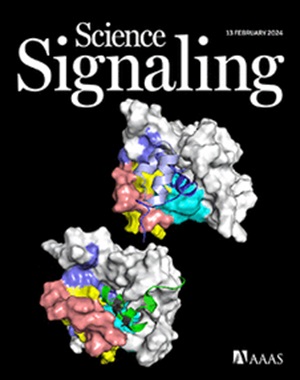Slow proliferation of BAP1-deficient uveal melanoma cells is associated with reduced S6 signaling and resistance to nutrient stress
IF 6.7
1区 生物学
Q1 BIOCHEMISTRY & MOLECULAR BIOLOGY
引用次数: 0
Abstract
Uveal melanoma (UM) is the deadliest form of eye cancer in adults. Inactivating mutations and/or loss of expression of the gene encoding BRCA1-associated protein 1 (BAP1) in UM tumors are associated with an increased risk of metastasis. To investigate the mechanisms underlying this risk, we explored the functional consequences of BAP1 deficiency. UM cell lines expressing mutant BAP1 grew more slowly than those expressing wild-type BAP1 in culture and in vivo. The ability of BAP1 reconstitution to restore cell proliferation in BAP1-deficient cells required its deubiquitylase activity. Proteomic analysis showed that BAP1-deficient cells had decreased phosphorylation of ribosomal S6 and its upstream regulator, p70S6K1, compared with both wild-type and BAP1 reconstituted cells. In turn, expression of p70S6K1 increased S6 phosphorylation and proliferation of BAP1-deficient UM cells. Consistent with these findings, BAP1 mutant primary UM tumors expressed lower amounts of p70S6K1 target genes, and S6 phosphorylation was decreased in BAP1 mutant patient-derived xenografts (PDXs), which grew more slowly than wild-type PDXs in the liver (the main metastatic site of UM) in mice. BAP1-deficient UM cells were also more resistant to amino acid starvation, which was associated with diminished phosphorylation of S6. These studies demonstrate that BAP1 deficiency slows the proliferation of UM cells through regulation of S6 phosphorylation. These characteristics may be associated with metastasis by ensuring survival during amino acid starvation.
BAP1缺陷的葡萄膜黑色素瘤细胞增殖缓慢与S6信号的减少和对营养压力的抵抗有关。
葡萄膜黑色素瘤(UM)是成人中最致命的眼癌。UM肿瘤中编码BRCA1相关蛋白1(BAP1)基因的失活突变和/或表达缺失与转移风险增加有关。为了研究这种风险的内在机制,我们探讨了 BAP1 缺乏的功能性后果。在培养和体内,表达突变型 BAP1 的 UM 细胞系比表达野生型 BAP1 的细胞系生长更慢。在 BAP1 缺乏的细胞中,BAP1 重组恢复细胞增殖的能力需要其去泛素化酶活性。蛋白质组分析表明,与野生型细胞和BAP1重组细胞相比,BAP1缺陷细胞中核糖体S6及其上游调节因子p70S6K1的磷酸化减少。反过来,p70S6K1 的表达增加了 S6 磷酸化和 BAP1 缺陷 UM 细胞的增殖。与这些发现相一致的是,BAP1突变型原发性UM肿瘤表达的p70S6K1靶基因数量较低,BAP1突变型患者衍生异种移植物(PDXs)中的S6磷酸化也降低了,在小鼠肝脏(UM的主要转移部位)中,PDXs的生长速度比野生型PDXs慢。缺乏 BAP1 的 UM 细胞对氨基酸饥饿的抵抗力也更强,这与 S6 磷酸化减少有关。这些研究表明,BAP1 缺乏会通过调节 S6 磷酸化减缓 UM 细胞的增殖。这些特征可能与转移有关,因为它们能确保细胞在氨基酸饥饿期间存活。
本文章由计算机程序翻译,如有差异,请以英文原文为准。
求助全文
约1分钟内获得全文
求助全文
来源期刊

Science Signaling
BIOCHEMISTRY & MOLECULAR BIOLOGY-CELL BIOLOGY
CiteScore
9.50
自引率
0.00%
发文量
148
审稿时长
3-8 weeks
期刊介绍:
"Science Signaling" is a reputable, peer-reviewed journal dedicated to the exploration of cell communication mechanisms, offering a comprehensive view of the intricate processes that govern cellular regulation. This journal, published weekly online by the American Association for the Advancement of Science (AAAS), is a go-to resource for the latest research in cell signaling and its various facets.
The journal's scope encompasses a broad range of topics, including the study of signaling networks, synthetic biology, systems biology, and the application of these findings in drug discovery. It also delves into the computational and modeling aspects of regulatory pathways, providing insights into how cells communicate and respond to their environment.
In addition to publishing full-length articles that report on groundbreaking research, "Science Signaling" also features reviews that synthesize current knowledge in the field, focus articles that highlight specific areas of interest, and editor-written highlights that draw attention to particularly significant studies. This mix of content ensures that the journal serves as a valuable resource for both researchers and professionals looking to stay abreast of the latest advancements in cell communication science.
 求助内容:
求助内容: 应助结果提醒方式:
应助结果提醒方式:


